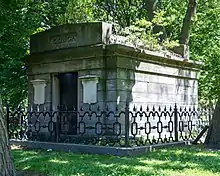Ira Couch
Ira Couch (November 11, 1806—February 28, 1857) was an American businessman known for his real estate holdings in Chicago, as well as for establishing and running the city's Tremont House hotel.
Ira Couch | |
|---|---|
| Born | November 11, 1806 |
| Died | February 28, 1857 (age 50) |
| Resting place | Lincoln Park in Chicago, Illinois (formerly the location of City Cemetery) |
| Nationality | American |
Couch posthumously obtained two further claims to notability. The first is that a legal dispute over the remaining portions of his estate was the subject of an 1891 United States Supreme Court case. The second is that he is buried in what is now the last remaining marked grave in Chicago's Lincoln Park. The land occupied by Lincoln Park had been occupied by the City Cemetery at the time of Couch's interment, but had seen corpses from the other marked graves relocated elsewhere beginning in the 1860s.
Life
Couch was born November 11, 1806, in New York state.[1]
In 1836, Couch and his elder brother James settled in Chicago.[1]
Couch worked as a tailor and haberdasher.[2] He ran a shop with his brother on Lake Street where they sold furnishing and tailoring supplies, but they sold the business less than a year after starting it.[1][3] They soon leased the rooming house where they had been staying, transforming it into the Tremont House hotel. It was located next door to their former business at the corner of Lake and Dearborn Streets.[1][3][4] It became one of the earliest hotels in the city, and one of the city's most famous hotels of its day.[5] The brothers would operate the hotel together.[3] After the hotel was lost in a fire four years later, he opened a new building at the opposite side of the intersection.[1] This new building was also lost to fire in 1849. After that, they reconstructed the hotel again, building what was the city's first grand hotel.[4]
Couch became a millionaire through acquisitions of land and real estate he and his brother made across the city's core.[1][4]
In 1853, Couch transferred the lease of the Tremont House to David Allen Gage and George W. Gage.[1][6]
Couch died at the age of 50 on February 28, 1857, during a winter stay with his family in Cuba. Couch had fallen suddenly ill shortly before his death.[1] His corpse was shipped back to Chicago, arriving on March 4. His funeral was held on March 6.[1]
At the time of his death, he was believed to be Chicago's second-wealthiest resident, after only William B. Ogden and John Wentworth.[4]
Legacy
The 1891 United States Supreme Court decision of Potter v. Couch pertained to his last will and testament, which was being litigated by family and other claimants seeking shares of the remainder of Couch's estate.[1][7] Couch's brother James Couch named his son born in 1848 Ira.[6] There is a street called Couch Place in the Chicago Loop, which divides the exact city block that the Tremont House once stood on. The Nederlander Theatre is on the south side of the alley.[8]
Tomb

After Couch's death, his family built a mausoleum in Chicago's City Cemetery.[2] He was entombed in it eighteen months after his death, making it his final resting place.[1] The mausoleum was designed by John M. Van Osdel, who had also designed the grand reconstruction of the Tremont House.[3][4] Its construction attracted great attention.[4] Beginning in the 1860s, the city began relocating corpses from the cemetery and reinterring them elsewhere, and the land was transformed into Lincoln Park. Today, Couch's tomb is the only remaining marked grave in the land that was once occupied the City Cemetery.[2] The tomb is located near the Chicago History Museum building.[2]
References
- Bannos, Pamela (2021). "Hidden Truths: Pamela Bannos". hiddentruths.northwestern.edu. Northwestern University. Retrieved 14 August 2021.
- Maggio, Alice. "Who is Buried in Couch's Tomb? Gapers Block: Ask the Librarian". www.gapersblock.com. Retrieved 14 August 2021.
- "Couch Tomb | Artwork | Chicago Park District". www.chicagoparkdistrict.com. Chicago Park District. Retrieved 14 August 2021.
- Keegan, Anne. "TALES OF THE CRYPT". chicagotribune.com. Chicago Tribune. Retrieved 14 August 2021.
- "Ira Couch". WTTW Chicago. 24 October 2011. Retrieved 14 August 2021.
- "James Couch Killed". Chicago Tribune. 11 February 1892. p. 1. Retrieved 1 August 2022.
- "Potter v. Couch, 141 U.S. 296 (1891)". Justia Law. Retrieved 14 August 2021.
- https://interactive.wttw.com/timemachine/tremont-house